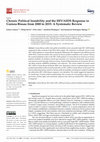Books by Amabelia Rodrigues

Tropical Medicine and Infectious Disease, 2021
Guinea-Bissau suffers from political instability and an unusually high HIV/AIDS burden
compared ... more Guinea-Bissau suffers from political instability and an unusually high HIV/AIDS burden
compared to other countries in the West Africa region. We conducted a systematic review on the HIV/AIDS epidemic in Guinea-Bissau during the Millennium Development Goals (MDGs) period (2000–2015), which dovetailed with a period of chronic political instability in the country’s history. We searched published works on the HIV/AIDS epidemic in Guinea-Bissau for references to chronic political instability. Six databases and the grey literature were searched, informed by expert opinion and manual research through reference tracing. Preferred Reporting Items for Systematic Reviews
and Meta-Analyses (PRISMA) guidelines were followed. The search yielded 122 articles about HIV/AIDS in Guinea-Bissau during the MDG years. Biomedical, clinical, or epidemiological research predominated public health research production on HIV/AIDS in Guinea-Bissau in this period. Six articles addressing themes related to chronic political instability, including how political instability has affected the HIV/AIDS disease response, were identified. The results suggest the importance
of considering a broader political epidemiology that accounts for socio-political aspects such as governance, human rights, and community responses into which any national HIV/AIDS response is integrated.
Papers by Amabelia Rodrigues

BMC Women's Health, 2013
Background There are few studies reporting mortality of women of reproductive age (WRA) in develo... more Background There are few studies reporting mortality of women of reproductive age (WRA) in developing countries. The trend and patterns of their mortality may be important for documenting the health status of the population in general. Methods We used a prospective open cohort of women aged 12 to 49 years living in the Bandim Health Project’s rural Health and Demographic Surveillance System (HDSS) in 5 regions of Guinea-Bissau from 1996 to 2007. Information on in- and out-migration and deaths were collected through the HDSS routine procedures. We assessed the trends in mortality and the associated determinants using Cox regression models. Results We followed 27,185 WRA for 141,693 person-years-at-risk (PYO) among whom 9,093 moved out and 1,006 died. Overall standardized mortality rate was 759 per 100,000 PYO. WRA mortality did not decline, but three periods could be distinguished: a stable mortality between 1996–2000 followed by 14% increase in mortality [Hazard rate ratio (HRR) = 1...

Uploads
Books by Amabelia Rodrigues
compared to other countries in the West Africa region. We conducted a systematic review on the HIV/AIDS epidemic in Guinea-Bissau during the Millennium Development Goals (MDGs) period (2000–2015), which dovetailed with a period of chronic political instability in the country’s history. We searched published works on the HIV/AIDS epidemic in Guinea-Bissau for references to chronic political instability. Six databases and the grey literature were searched, informed by expert opinion and manual research through reference tracing. Preferred Reporting Items for Systematic Reviews
and Meta-Analyses (PRISMA) guidelines were followed. The search yielded 122 articles about HIV/AIDS in Guinea-Bissau during the MDG years. Biomedical, clinical, or epidemiological research predominated public health research production on HIV/AIDS in Guinea-Bissau in this period. Six articles addressing themes related to chronic political instability, including how political instability has affected the HIV/AIDS disease response, were identified. The results suggest the importance
of considering a broader political epidemiology that accounts for socio-political aspects such as governance, human rights, and community responses into which any national HIV/AIDS response is integrated.
Papers by Amabelia Rodrigues
compared to other countries in the West Africa region. We conducted a systematic review on the HIV/AIDS epidemic in Guinea-Bissau during the Millennium Development Goals (MDGs) period (2000–2015), which dovetailed with a period of chronic political instability in the country’s history. We searched published works on the HIV/AIDS epidemic in Guinea-Bissau for references to chronic political instability. Six databases and the grey literature were searched, informed by expert opinion and manual research through reference tracing. Preferred Reporting Items for Systematic Reviews
and Meta-Analyses (PRISMA) guidelines were followed. The search yielded 122 articles about HIV/AIDS in Guinea-Bissau during the MDG years. Biomedical, clinical, or epidemiological research predominated public health research production on HIV/AIDS in Guinea-Bissau in this period. Six articles addressing themes related to chronic political instability, including how political instability has affected the HIV/AIDS disease response, were identified. The results suggest the importance
of considering a broader political epidemiology that accounts for socio-political aspects such as governance, human rights, and community responses into which any national HIV/AIDS response is integrated.